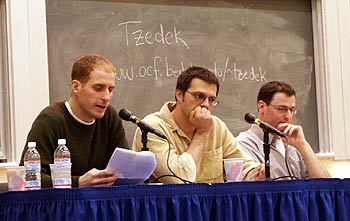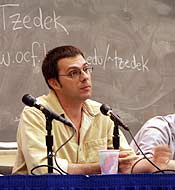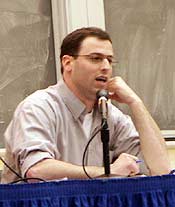 |
Three Israeli refuseniks,
left to right: Ron Gerlitz, a software engineer now living in Cupertino;
Ofer
Shorr, a translator married to a UC Berkeley graduate student; and Ishai
Rosen Zvi, a visiting scholar in Berkeley's Near Eastern Studies department. (BAP photos) |
Refuseniks: Three Israeli soldiers tell why they will not serve in the occupied territories
BERKELEY - For his required three years of active service in the Israeli Defense Forces (IDF), Ishai Rosen-Zvi was stationed at a checkpoint in Gaza starting in 1990. He didn't see much action there, but the very banality of his everyday interactions with Palestinians began the process that turned him into a "refusenik" — one of the estimated 1,100 IDF soldiers who have signed conscientious-objector pledges declaring they will not serve in Israel's occupied territories.
"We did not meet terrorists. They did not come to our roadblocks," Rosen-Zvi told a UC Berkeley audience. "But we did meet many people. Most of them were very poor. They were just trying to get to their jobs ... I have a vivid picture. It is 4:45 a.m. and the line [to cross a checkpoint] is hundreds, sometimes thousands of people long, some waiting with food in their hands. All their fate depends on some 19-year-old commander. If they are lucky, this guy already spoke with his girlfriend that morning and everything will go smoothly ... You see their eyes. They're looking at you with fear, frustration, hatred. You are their prison guard."
Rosen-Zvi joined two other soldiers to deliver a March 11 lecture at Dwinelle Hall called "Why Do We Refuse to Serve in the Occupied Territories? Israeli Voices Against the Occupation." The event was organized by Tzedek (a Hillel-sponsored Jewish group at UC Berkeley), funded by the Middle East Educational Programs Fund, and cosponsored by the Chancellor's Educational Activities Committee, the Center for Middle East Studies, UC Berkeley Human Rights Center, Tikkun, Boalt Hall International Human Rights Student Board, Students for Justice in Palestine, A Jewish Voice for Peace, and the ASUC. Courage to Refuse and Yesh Gvul ("There is a limit")— the organization of the refuseniks and the network that supports them in their stance — were also cosponsors.
Although the refuseniks' official numbers represent but a fraction of the 1.3 million Israeli males fit for military service — Israeli law does not recognize conscientious objection for men, it does allow it for women — they are making their influence felt in lecture tours like this one. "They say we are just a small minority," said one of the speakers. "We are a minority, yes, but not a small one."
'We shall take no part'
Since August, Rosen-Zvi has been teaching Talmud in UC Berkeley's Near Eastern Studies department as a visiting scholar, on leave from his Ph.D. studies at Tel Aviv University. Sometimes stammering with passion and the determination to find the right words, he summarized his experience in Gaza, "For me, a good child from Tel Aviv, this is very crucial. It's there I understood that it's a very dirty story. And I am on the dirty side."
Ron Gerlitz, the second speaker, is originally from Jerusalem and for the last five months has been working as a software engineer in Cupertino. Ofer Shorr, a captain in the IDF Reserve, translates fiction from English into Hebrew and has lived in the U.S. for nearly five years with his wife, a graduate student in Berkeley's comparative literature department.
| Glossary intifada Translation of Arabic phrase for "shaking off." Refers to a series of protests and riots, beginning in 1987, by Palestinians in the occupied territories occupied territories Regions of the Gaza Strip, the West Bank, and Golan Heights that have been occupied by the Israelis since the Six-Day War of 1967 refusenik Refers to soldiers in the Israeli Defense Forces who will not serve in the occupied territories, as well as those who in protest will not serve in the IDF at all Zionist From (Mount) Zion, ancient Hebrew term for Jerusalem, symbolizing national-religious hopes for a Jewish homeland |
The three men were there to share their stories of what ultimately led them to a position whose unpopularity has trailed them from Israel to much of the United States.
All three have signed the "Combatants Letter of Courage to Refuse," that includes the signature of some 500 soldiers. The letter states that these combat officers and soldiers "who have served the State of Israel for long weeks every year, in spite of the dear cost to our personal lives, have been on reserve duty all over the occupied territories (areas in the West Bank and Gaza formerly under Palestinian control), and were issued commands and directives that had nothing to do with the security of our country, and that had the sole purpose of perpetuating our control over the Palestinian people." It goes on to declare that the signatories will not "continue to fight beyond the 1967 borders in order to dominate, expel, starve and humiliate an entire people. We hereby declare that we shall continue serving in the Israel Defense Forces in any mission that serves Israel's defense. The missions of occupation and oppression do not serve this purpose — and we shall take no part in them."
Last year Rosen-Zvi received a routine reserve duty summons for a week-long stint in the Nablus area, one of the occupied territories. He refused to carry out the order and was jailed for two weeks.
'This is not democracy'
Citing his rough grasp of English, Gerlitz read from a prepared statement. He told how he was drafted at age 18, 11 years ago, and spent his three mandatory years as an officer in the Israeli navy. "I believed then that taking part in the defense of Israel was the right thing to do," he said. "And I still do."
The distinction that all three speakers were careful to make, however, is what constitutes "defense." They emphasized their essential patriotism and their belief in the validity of an Israeli state. For his part, Gerlitz focused on the Israeli government's identity as a democracy. "I believe that to refuse to serve is a democratic action," he argued. "Democracy is not just a majority decision. It must protect the rights of the minority, including basic human rights ... Curfews, tortures, checkpoints, closures — these are not democracy. Preventing freedom of movement, freedom to get medical treatment, this is not democracy."
Gerlitz also gave a brief history of the Refusenik movement in Israel. Coined originally to describe a Jewish person who was refused an exit visa from the Soviet Union, the term now applies both to combat soldiers who will not fight in the occupied territories as well as conscientious objectors who refuse to serve at all in the IDF. The latter group includes Jonathan Ben-Artzi, whose uncle is former Israeli prime minister Benjamin Netanyahu and who has been jailed for months.
The first Refuseniks surfaced in 1982, in response to the Israeli incursion of Lebanon. At least 168 servicemen were jailed for refusing to serve in a campaign that they felt was "an act of naked and futile aggression," according to the Israeli peace group Yesh Gvul. The first Palestinian "intifada" (series of protests and riots) in 1987 inspired several hundred more soldiers to disobey orders. The second intifada, which began two years ago, gave birth to a huge wave of military protesters and the "Courage to Refuse" group. By Gerlitz's count, more than 1,500 soldiers have refused to serve in the occupied territories since the beginning of the last intifada.
Gerlitz himself took part in the 1996 bombing of Lebanon. "In retrospect I should have said no," he admitted quietly. (Read his account of "Operations Grapes of Wrath" in Lebanon.)
He was the 55th soldier to sign the "Courage to Refuse" statement. As a result, he said, "Some Jews and others say I am anti-Israel. That is a mistake. I am against government policy, not Israel itself. We cannot stop the IDF but we can give the soldiers and the public some alternatives. If there will not be soldiers ready to serve in the occupied territories, there will be no occupation."
'Power poisons you'
Shorr, the oldest of the three Refuseniks, enlisted in 1985. He volunteered for the infantry unit and served in Gaza. Before he entered the service, he thought that Palestinians "did not like the occupation, but you know, they accepted it."
 'I was witness to beatings, roadblocks, curfew, going in the middle of the night to get people. And I thought it was OK because we were all decent people — no Satans or demons.' -Ofer Shorr
|
Only after moving to the United States did his attitude begin to change: "I thought about how if in the U.S., if troops fired and killed 13 citizens, what an outcry there would be." He added his name to the letter.
Said Shorr, "There were 190 days of curfew last year...hundreds of secret assassinations. Since the beginning of the current intifada, 2,000 Palestinians have been killed, 332 of them children under 18. [Israeli] settlements have grown by 50 percent, while the number of settlers has grown by 100 percent."
Like the others, Shorr reiterated his faith in Israel as a country. "I do believe Israel has a right to exist. Zionism is not perfect, but it is not malicious, yet I began to see that Israelis are unwillingly blind. They do not want to see the things that are done in their name ... The occupation is a cancer and it is eating actively the Palestinian society and passively the Israeli. If it is not stopped it will consume them both."
'People are starving'
In response to a query about what international intervention would be most helpful in Israel, Shorr shrugged before attacking the U.S. for its billions in military aid to Israel. "I believe this money only does bad," he said. "Israel can protect itself. These weapons only hurt Palestinians."
 'I don't think Sharon's dream is expulsions. He wants them to think not of a state, but about bread. People are starving. This is not a metaphor. People are literally starving 10 miles from Jerusalem.' -Ishai Rosen-Zvi
|
Unquestionably, the conflict has had an economic effect. On March 5, The New York Times reported that a World Bank study found that almost 2 million Palestinians in the West Bank and Gaza Strip, or 60 percent of the occupied territories, live below the poverty level of $2 a day — triple the number from before the intifada conflict began with Israel more than two years ago. A majority of Palestinians are unemployed, the study found, and investment in the Palestinian economy has plummeted from $1.5 billion in 1999 to $140 million last year. The World Bank and the United Nations, which also conducted a similar study, both "said that the cause of the collapse of the Palestinian economy was the closures imposed on Palestinian areas by the Israeli Army," according to the Times.
Asked whether they planned to visit members of Congress to tell their stories, the Refuseniks laughed, saying they did not have friends in high places.
"People in Israel didn't have a lot of patience for me," said Rosen-Zvi. "But compared to here, they were very patient. Here you have to identify yourself in an instant. 'Are you pro-Israel or anti-Israel?' There is no in between."
The Refuseniks suggested that American Jews could help bring the violence to an end by following the example of Irish-Americans in that country's conflict. They argued that if "Sharon could lose even a little support among the Jewish community here, it could make a huge difference."
More information:

